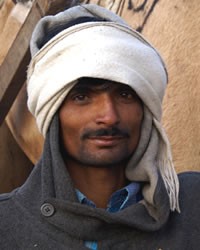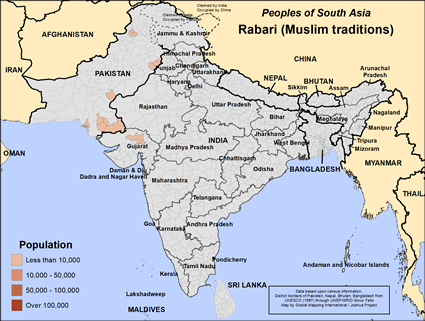Rabari (Muslim traditions) in Pakistan

Photo Source:
Copyrighted © 2026
Isudas All rights reserved. Used with permission |

Map Source:
People Group data: Omid. Map geography: UNESCO / GMI. Map Design: Joshua Project
|
| People Name: | Rabari (Muslim traditions) |
| Country: | Pakistan |
| 10/40 Window: | Yes |
| Population: | 9,500 |
| World Population: | 10,600 |
| Primary Language: | Punjabi, Western |
| Primary Religion: | Islam |
| Christian Adherents: | 0.00 % |
| Evangelicals: | 0.00 % |
| Scripture: | New Testament |
| Ministry Resources: | Yes |
| Jesus Film: | Yes |
| Audio Recordings: | Yes |
| People Cluster: | South Asia Muslim - other |
| Affinity Bloc: | South Asian Peoples |
| Progress Level: |
|
Introduction / History
The Rabari (also called the Bhopa) originally lived in Balochistan, a geographical area encompassing parts of Pakistan, Iran, and Afghanistan. In the 12th and 14th centuries, they migrated to the areas in Pakistan and India where they now live. Their histories intertwine with those of the Rajputs and the Charans, two other migrant groups in the region. For this reason, some consider them to be on the same social level as the prestigious Rajputs.
The name Rabari means "outsider," a fitting description of their traditional nomadic lifestyle. The Rabari are known for herding camels and are sometimes associated with the gypsies.
The vast majority of Rabari live in India and practice Hinduism (a much smaller number in India practice Islam). Both Hindu Rabaris and Muslim Rabaris are also in Pakistan, though in much smaller numbers.
What Are Their Lives Like?
The Rabaris have 133 subgroups and only marry within their people group. They practice both adult and child marriage. Women do not have inheritance rights but participate in important family decisions. Married women can be identified by their dress and by face veiling before older relatives.
Distinctive dress characterizes the Rabaris. Ornaments for young, adult and old males differ with regard to their marital status and number of children. Bride prices tend to be high because of their high status.
For centuries Rabari women have been noted for their fine embroidery. Girls learn embroidery at a young age and collect either the cloth or the money by selling it for their dowry. Rabari women take care of the household work and look after milk cows while the men tend to other livestock.
Over time, the Rabari have mostly left their nomadic lifestyle. Today, most are settled on the outskirts of town, living semi-nomadic or settled lives.
What Are Their Beliefs?
Traditionally, the Rabaris practiced Hinduism. Small numbers of them in both India and Pakistan have converted to Islam. In both India and Pakistan, the Rabaris are considered a frontier people, meaning that the population is less than 0.1% Christian and there is no known gospel movement among them.
Muslim Rabari people follow Sunni Islam. As followers of the Koran, the Rabari understand Jesus to be a great prophet (referred to in the Koran as Isa al-Masih). But they do not believe in him as the only sacrifice for their sins.
In most of the Muslim world, peoples like the Rabari depend on the spirit world for their daily needs since they regard Allah as too distant. Allah may determine their eternal salvation, but the spirits determine the circumstances of their daily lives. For that reason, they appease the spirits, using charms and amulets to help them with spiritual forces.
What Are Their Needs?
The Rabari speak Western Punjabi. Scripture resources available in Western Punjabi include the New Testament, the JESUS Film, and various gospel recordings.
There are no known followers of Jesus among the Rabaris. Pakistan limits access from outsiders, and the infamous blasphemy laws provide a significant barrier to gospel witness.
Prayer Points
Ask the Holy Spirit to give Muslim Rabari people teachable and understanding hearts.
Pray for conviction of sin, righteousness and judgment, and for God to reveal to the Rabari their need for a savior.
Pray that a strong movement of the Holy Spirit will bring entire Rabari families into a rich experience of God's blessing.
Ask God to lead believers, especially Pakistani believers, into sustained, focused prayer for the Rabari and to raise up workers from the church in Pakistan for this harvest field.
Pray for the Lord to open the hearts of Rabari family leaders to experience God's blessing through a movement of family-based discovery Bible studies.
Ask God to raise up a movement among the Muslim Rabari of Pakistan that will result in multiplying churches and disciples.